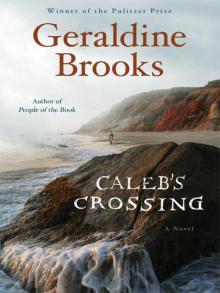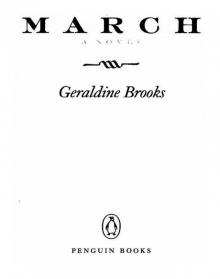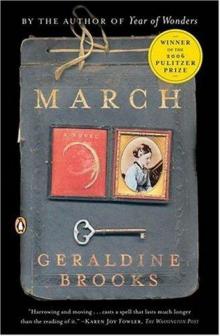- Home
- Geraldine Brooks
The Best American Short Stories® 2011 Page 4
The Best American Short Stories® 2011 Read online
Page 4
Housewifely Arts
Megan Mayhew Bergman
FROM One Story
I AM MY OWN HOUSEWIFE, my own breadwinner. I make lunches and change light bulbs. I kiss bruises and kill copperheads from the backyard creek with a steel hoe. I change sheets and the oil in my car. I can make a pie crust and exterminate humpback crickets in the crawlspace with a homemade glue board, though not at the same time. I like to compliment myself on these things, because there's no one else around to do it.
Turn left, Ike says, in a falsetto British accent.
There is no left—only a Carolina road that appears infinitely flat, surrounded by pines and the occasional car dealership billboard. I lost my mother last spring and am driving nine hours south on I-95 with a seven-year-old so that I might hear her voice again.
Exit approaching, he says from the back seat. Bear right.
Who are you today? I ask.
The lady that lives in the GPS, Ike says. Mary Poppins.
My son is a forty-three-pound drama queen, a mercurial shrimp of a boy who knows many of the words to Andrew Lloyd Webber's oeuvre. He draws two eyes and a mouth on the fogged-up window.
Baby, don't do that unless you have Windex in your backpack, I say.
Can you turn this song up? he says.
I watch him croon in the rearview mirror. He vogues like Madonna in his booster seat. His white-blond shag swings with the bass.
You should dress more like Gwen Stefani, he says.
I picture myself in lamé hot pants and thigh-highs.
Do you need to pee? I ask. We could stop for lunch.
Ike sighs and pushes my old Wayfarers into his hair.
Chicken nuggets? he asks.
If I were a better mother, I would say no. If I were a better mother, there would be a Ziploc baggie in a cooler with a crustless PB&J, a plastic bin of carrot wedges and seedless grapes. If I were a better daughter, Ike would have known his grandmother, spent more time in her arms, wowed her with his impersonation of Christopher Plummer's Captain von Trapp.
How many eggs could a pterodactyl lay at one time? Ike asks.
Probably no more than one, I say. One pterodactyl is enough for any mother.
How much longer? Ike asks.
Four hours.
Four hours till what?
You'll see, I say.
What I'm having trouble explaining to Ike is this: We're driving to a small roadside zoo outside of Myrtle Beach so that I can hear my mother's voice ring through the beak of a thirty-six-year-old African gray parrot, a bird I hated, a bird that could beep like a microwave, ring like a phone, and sneeze just like me.
In moments of profound starvation, the exterminator told me, humpback crickets may devour their own legs, though they cannot regenerate limbs.
Hell of a party trick, I said.
Our house has been for sale for a year and two months and a contract has finally come in, contingent on a home inspection. The firm I work for has offered to transfer me to Connecticut—a paralegal supervisory position in a state where Ike has a better chance of escaping childhood obesity, God, and conservative political leanings. I can't afford to leave until the house sells. My realtor has tried scented candles, toile valances, and apple pies in the oven, but no smokescreen will detract from the cricket infestation.
They jump, the realtor said before I left town with Ike. Whenever I open the door to the basement, they hurl themselves at me. You'll never pass a home inspection, he said. They're like spiders on steroids. Do something.
The exterminator already comes weekly, I said. And I've installed sodium vapor bulbs.
I'll see you Sunday, the realtor said, walking to his compact convertible, his shirt crisp and tucked neatly into his pressed pants. I'll come over for a walk-through before the inspection.
That night Ike and I covered scrap siding in glue and flypaper and scattered our torture devices throughout the basement, hoping to reduce the number of crickets.
You're coming down later to get the bodies, Ike said. Because I'm not.
He shivered and stuck out his tongue at the crickets, which flung themselves from wall to ledge to ceiling.
What if we live here forever? he asked.
People used to do that, I said. Live in one house their entire life. My mother, for instance.
I pictured her house, a two-bedroom white ranch with window boxes, brick chimney, and decorative screen door. The driveway was unpaved—an arc of sand, grass, and crushed oyster shells that led to a tin-covered carport. Growing up, there was no neighborhood—only adjoining farms and country lots with rambling cow pastures. People didn't landscape in fancy ways then. Mom had tended her azaleas and boxwoods with halfhearted practicality, in case the chickens or sheep broke loose. The house, recently bought by a corporate real estate firm, was empty now, a tiny exoskeleton on a tree-cleared lot next to a Super Walmart.
I thought about Mom then, and her parrot. If we moved, this might be my last time to hear her voice.
I pull into a rest stop, one of those suspicious gas station and fast-food combos. Ike kicks the back of the passenger seat. I scowl in the rearview.
I need to stretch, he says. I have a cramp.
Ike's legs are the size of my wrist, hairless and pale. He is sweet and unassuming. He does not yet know he will be picked on for being undersized, for growing facial hair ten years too late.
I want to wrap him in plastic and preserve him so that he can always be this way, this content. To my heart, Ike is still a neonate, a soft body I could gently fold and carry inside of me again. You can just see the innocence falling off a child's face—every day.
Ike and I lock the car and head into the gas station. A burly man with black hair curling across his shoulders hustles into the restroom. He breathes hard, scratches his ear, and checks his phone. Next, a sickly-looking man whose pants are too big shuffles inside. He pauses to wipe his forehead with an elbow. I think, These people are someone's children.
I clench Ike's hand. I can feel his knuckles, the small bones beneath his flesh.
Inside, the toilets hiss. I hold Ike by the shoulders; I do not want him to go in alone.
Garlic burst, he reads from a cellophane bag. Big flavor!
I play with his cowlick. When he was born, I could see a whorl of hair on the crown of his head like a small, stagnant hurricane. Ike also had what the nurse called stork bites on the back of his neck and eyelids.
The things my body has done to him, I think. Cancer genes, hay fever, high blood pressure, perhaps a fear of math—these are my gifts.
I have to pee, he says.
I release him, let him skip into the fluorescent, germ-infested cave, a room slick with mistakes and full of the type of men I hope he'll never become.
The first time I met my mother's parrot, he clung to a wrought iron perch on the front porch as we ate breakfast outside. Claiming the house was too quiet, Mom adopted Carnie from a neighbor one month after Dad's funeral, and constructed an extensive cage for him both indoors and out.
Carnie could already imitate the sound of oncoming traffic, an ambulance siren, leaves rustling, the way Pete Sampras hit a tennis ball on TV. He could replicate my mother's voice completely, her contralto imitations of Judy Garland and Reba McEntire, the way she answered the phone. What are you selling? I'm not interested.
The bird moved from his perch to my shoulder without permission.
Mom, I said. Get this damn bird off of me.
Language! she warned. He's a sponge.
I was still grieving Dad, and it was strange to watch Mom find so much joy in this ebony-beaked wiseass.
What are you selling? he said. I already have car insurance. Carnie spoke with perfect inflection, but he addressed his words to the air—a song, not conversation.
You can't take anything personally, Mom warned.
The man of the house is not here, Carnie said. He's dead.
You really take it easy on those telemarketers, I said, looking a
t Mom.
Dead, dead, dead, Carnie said.
That night he shredded the newspaper in his enclosure, which smelled like a stable. Lights out, Mom said, and tossed a threadbare beach towel over his cage. Carnie belted out the first verse of Patsy Cline's "Walkin' After Midnight," then fell silent for the evening. His parlor tricks seemed cheap, and I hated the easy way he'd endeared himself to Mom.
Later that week, Carnie became violently protective of her. Wings clipped, he chased me on foot through the halls and hid behind door frames, not realizing his beak stuck out beyond the molding. As I tried to shoo him from the kitchen counter, he savagely bit my wrist and fingers. Then, days later, as if exchanged for a new bird, Carnie lightened up, and preened my hair while perched on the back of the couch.
I'll take him to a specialist, Mom said, mildly apologetic for her bird's bipolar antics. She was a perfectionist, and I knew she wanted a bird she could be proud of. But I think part of her was flattered by Carnie's aggressive loyalty.
Show me how you pet the bird, the behaviorist had said.
Carnie, inching left and right on Mom's wrist, cocked his head to one side and shot us the eye. Like a whale, he gave us one side of his face at a time, revealing a tiny yellow iris, one that looked out at the world with remarkable clarity, ensconced in a white mask the size of a thumbprint.
Mom ran her pointer finger down Carnie's chest.
I don't know how to tell you this, the behaviorist said, but you've been sexually stimulating your parrot.
Mom blushed.
Inadvertently, the behaviorist said. Of course.
He thinks I'm his mate? Mom asked.
Less cuddling, the specialist said, more cage time.
I called three places to find Carnie—the plumber who took him after Mom, the bird sanctuary he'd pawned the parrot off on, then the roadside zoo. Now the car is too warm and I'm falling asleep, but I don't want to blast Ike with the AC. He's playing card games on the console.
Are we leaving so that people can move into our house? Ike asks.
We're going to Ted's Roadside Zoo, I say.
Go fish, Ike says. What's at the zoo?
There's a bird I want to see, I say.
What, he asks, is gin rummy?
We pass a couple in a sedan. The woman is crying and flips down her visor.
It's hard being a single mom, but it's easier than being a miserable wife. I hardly knew Ike's father; he was what I'd call a five-night stand. We used to get coffee at the same place before work. A director of the local college theater, he was a notorious flirt but already married. Separated, he'd claimed. He sends a little money each month, but doesn't want to be involved. The upside to our arrangement is simplicity.
I put some pressure on the gas and pass a school bus.
Did I tell you about Louis's mom? Ike says. How she got on the bus last week?
Louis's mom is a born-again Christian with two poodles and a coke habit, the kind of person I avoid at T-ball games and open houses at school.
Tuesday afternoon, Ike says, she boarded the bus with her dogs, raised her fist, and said, "Christ is risen! Indeed, he is risen."
No, I say. Really?
Ike pauses for a minute, as if he needs time to conjure the scene. Really, Ike says. Louis pretended not to know her when she got on, but his mom held on to that chrome bar at the front of the bus and said, "Lord, I've been places where people don't put pepper on their eggs." And she started to dance.
Ike waves his arms in front of his face, fingers spread, imitating Louis's strung-out mother. I see the rust-colored clouds of eczema on his forearms. I want to fix everything. I want him to know nothing but gentle landings. I don't want him to know that people like Louis's mom exist, that people fall into landmines of pain and can't crawl back out.
When Ike was almost a year old, I took him by for Mom to hold while I emptied the old milk from her fridge and scrubbed her toilets. The house was beginning to smell; Mom was not cleaning up after the bird. Suddenly, the woman who'd ironed tablecloths, polished silver, bleached dinner napkins, and rotated mattresses had given up on decorum.
Would you like to hold Ike while I clean? I said.
Mom sat in a brown leather recliner, Carnie in his white lacquered cage a foot away from her—almost always within sight. She was losing weight and I worried she wasn't eating well. I brought cartons of cottage cheese and chicken salad, only to find them spoiled the following month.
Are you trying to sell my house? she said. Are you giving realtors my number? They're calling with offers.
There's a shopping center going in next door, I said. This may be your chance to sell.
I placed Ike in her arms.
It's not hard to lose the baby weight, Mom said, eyeing my waistline, if you try.
I was determined not to fight back. There was heat between us, long-standing arguments we could still feel burning. Should we sell Dad's tools? Should she go to the eye doctor? Who would care for her goddamned bird? Didn't I know how hard they'd worked to give me the right opportunities? Our disagreements were so sharp, so intense that we'd become afraid to engage with each other, and when we stopped fighting, we lost something.
You're like your father now, she said. You never get mad, even when you want to.
It was true—Dad was hard to anger, even when I'd wasted $15,000 of his hard-earned money my freshman year of college at a private school they couldn't afford. The night I came home for the summer, he'd sat with his hands in his lap and a look on his face that was more sad than disappointed. Mom stood behind him, silent and threatening. I knew later she'd berate him for taking it easy on me, and I hated her for it.
I guess you'll need to get a job, he said.
Dad, I said. I made a lot of mistakes this year—
I wanted to give you a good chance, he said, looking down at his fingers.
I remember feeling relieved that he wasn't yelling at me. Now I wish he had.
I'd do it again, he said. But you understand, there just isn't enough money.
I tortured myself imagining each of his hours. He worked at the same plant for twenty-six years making industrial-quality tools—hammers, chisels, knives, clamps. Every day he ate a cold lunch on a bench caked with pigeon shit. I could almost hear the echoes of men moving and talking, their spoken lives bouncing from the plant rafters as their hands worked. The black hole of his effort, the way it would never be enough, or easy—it hung over me, a debt I couldn't pay.
Mom ran her fingers over Ike's cowlick. I emptied the trash can in the kitchen, then the living room.
While you're at it, she said, would you change the newspaper in Carnie's cage? And top off his water?
As I approached the bird's cage, he let out a piercing cry, his black beak open. I held my hand up as if to say "Stop." Cut it, I said.
Put your hand down, Mom said. You're scaring him.
Carnie continued to scream. It was a pleading, horrifying sound, like an alarm. He cocked his head and danced across his bar, shrieking. Ike began to cry.
Never mind, Mom said. I'll do it.
She thrust Ike in my arms and marched toward the cage. When she opened the door, Carnie scampered onto her finger, and she brought him to her shoulder. He was silent. Mom pulled the newsprint from the bottom of his cage with bare hands. Dried birdshit fell to the carpet; she didn't seem to notice.
Let me help you, I said. Sit down. I can do this.
Sit down, Carnie said. Sit down. Sit down.
Mom ignored me and moved to the kitchen, stuffing the soiled papers into the trash can.
You should wash your hands, I said.
Don't tell me what to do, she said.
Sit down, Carnie said. Sit down.
I found Carnie's high-volume pleas disconcerting and worried they agitated Ike, who clung to my shoulder. There were things, once, that I thought I deserved. My parents' money, and certainly their unconditional love. But as years passed, our love had turned into a bartering syst
em, a list of complicated IOUs.
I'm sorry, I said. I don't know about birds.
You'll learn, Mom said. Soon.
Ike and I arrive in Myrtle Beach at eight P.M. I know the zoo will be closed at this hour, so we find a Day's Inn. There's something about the hum of an ice machine and waterlogged AstroTurf that takes me back to childhood.
Ike face-plants onto the bed before I can remove the comforter.
Wait a second, baby, I say. Let me get that dirty thing off.
We get in bed and flip channels. Ike holds the fabric of my pajama legs with one hand, wraps the other around a blanket my mother crocheted for me when I was in college. His travel blanket. I'm racked with sadness every time I see it: the coral and black starbursts, the tight knots.

 Year of Wonders
Year of Wonders People of the Book
People of the Book The Secret Chord
The Secret Chord Foreign Correspondence
Foreign Correspondence Nine Parts of Desire (Korean Edition)
Nine Parts of Desire (Korean Edition) Caleb's Crossing
Caleb's Crossing The Idea of Home
The Idea of Home Foreign Correspondence: A Pen Pal's Journey
Foreign Correspondence: A Pen Pal's Journey March
March March: a novel
March: a novel The Best American Short Stories® 2011
The Best American Short Stories® 2011 Nine Parts of Desire
Nine Parts of Desire